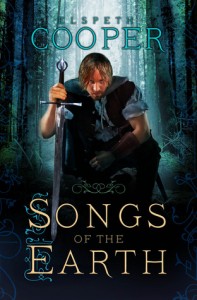 Songs of the Earth by Elspeth Cooper
When Gair, a Suvaeon knight-in-training, is accused of witchcraft, he is sure that his life is about to come to a fiery end as he's burned at the stake. But even as all hope seems lost, he is granted a reprieve by a mysterious benefactor. Branded a witch and exiled from the parish, Gair has no choice but to accept help from a man who seems to know more than Gair does about the magic that sings in his veins. Perhaps with his help Gair can learn to control it, harness it and use it to fight for his freedom and a life he never dreamed he'd have a chance to live.
Songs of the Earth by Elspeth Cooper
When Gair, a Suvaeon knight-in-training, is accused of witchcraft, he is sure that his life is about to come to a fiery end as he's burned at the stake. But even as all hope seems lost, he is granted a reprieve by a mysterious benefactor. Branded a witch and exiled from the parish, Gair has no choice but to accept help from a man who seems to know more than Gair does about the magic that sings in his veins. Perhaps with his help Gair can learn to control it, harness it and use it to fight for his freedom and a life he never dreamed he'd have a chance to live.
I picked this book up because it is what sparked the Special Needs in Strange Worlds series over at Bookworm Blues. The discussion was excellent, and I really wanted to see how Elspeth Cooper had handled the subject of disability in fantasy.
Unfortunately, as a reader, this book didn't really work for me. I found it really hard to get into, and I had a couple problems with it along the way. I didn't feel like there was a clear goal for the protagonist. Gair is trying to get out of the parish because he has been banished but then what? It seemed like his entire purpose was to stay just ahead of the witchfinder, and I wanted more than that. I crave a hero with a goal I can root for. And Gair just didn't fit the bill. He was rather aimless and a bit dense at times. It took him a quarter of the book to figure out what I guessed in the first few pages. I can see making a reader feel smart, but not at the expense of the character.
And along with a goal-oriented hero, I want a bad guy to hide under the covers from. Again Songs of the Earth failed to deliver. The antagonist didn't even show up until the last few chapters of the book (he made an appearance once early on, but the meeting meant nothing to me because it didn't appear to mean anything to the characters at the time). And Cooper describes him simply as evil. With no motivation and no insight into his character, he ended up being about as scary as a milkmaid.
There was also something about Cooper's style that kept throwing me off. Things that I thought were momentous or interesting were glossed over or treated as ordinary. A new and amazing secret is revealed about Gair without the surrounding drama and fanfare that should have heralded it. Some dialogue tells me it's special, but the feelings of the character and the exposition tell me it's mundane. As a reader, I was confused. What was important and what wasn't? Was I missing something really subtle or was I just finding certain  things anticlimactic? Hard to tell.
things anticlimactic? Hard to tell.
Putting all that aside (it's just opinion anyway, feel free to make your own) I did enjoy the story once I got into it. I'm a sucker for schools and students in my fiction. Especially if there's magic involved. Arrows of the Queen by Mercedes Lackey, Wild Magic by Tamora Pierce, Griffin Rising by Darby Karchut (more on Darby's book coming later). They all strike a tender cord in me and Songs of the Earth was no different. Once Gair reached Chapterhouse, that was where I got hooked, even if I disagreed with some of the choices he made there. I really like classes and teachers and ranks. Sigh. I miss school. Oh stop making that face, I already  know I'm weird.
know I'm weird.
Given my own interests and the reasons I picked up this book, I wanted more discussion about the disabilities, but I think I've decided I really liked the way Cooper handled them. Ansel has severe arthritis, Aysha has a debilitating limp and Darin has diabetes, but these conditions have little bearing on the story. The weaknesses are just another facet of the characters. I'll admit that when I write about characters with disabilities I'm hoping to promote awareness. But Elspeth Cooper said that she had no agenda when creating Ansel, Aysha and Darin. The result is a deeper, more unique and believable character. Not that it's wrong to create a character for a specific purpose. It's just nice to see that people with disabilities can have a place as normal characters filling out and providing depth to a fantasy world.
So while this wasn't my favorite book ever, I think it did have some redeeming qualities. I'm wondering what will happen to Gair, and Ansel, and that healer from Astolan (whose name is escaping me and I don't have the book nearby, sorry). And just for that I'll probably pick up the sequel when it comes out.
